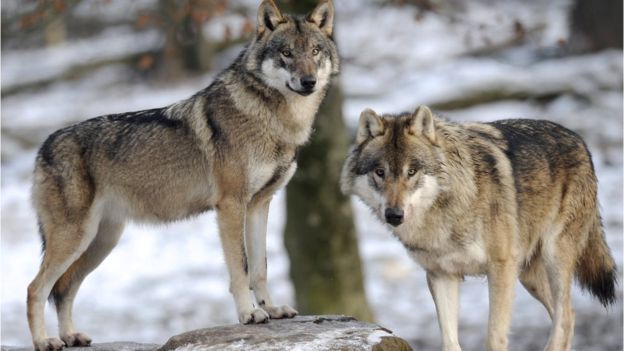
PHOTO: bbc.com
After over 200 years of waiting, scientists in Denmark say the country finally has a pack of wild wolves. Wolves hadn’t been seen in the area until five years ago, when one was spotted in Jutland. Danish scientists have been waiting with baited breath to see whether or not a wolf of the opposite sex would meet the one spotted in Jutland and mate. Now, finally, it seems they have.
In areas where wolves are native inhabitants, they play an important role in the ecosystem. Wolves prey on smaller animals, who, if left to themselves, would over-breed and overgraze the native vegetation. Overgrazing leads to erosion and other problems which destroy the health of a natural area.
According to the Copenhagen Post, DNA-evidence from some feces recovered from Jutland show that a female wolf has indeed turned it into her territory. Some CCTV images show that another wolf has joined her.
“We expect that they will have cubs this year or the next,” Peter Sunde of Aarhus University said.
Wolves only pair up in the wild to breed. The female has traveled a very long way to find a mate. Danish scientists studying her DNA believe she’s traveled over 340 miles, from Germany’s Schleswig-Holstein region, to her new territory in Jutland. She’s not alone. Optimistic reports conclude that there may be as many as 40 wolves in Denmark, now. Authorities are reluctant to disclose the wolves’ locations, however, since they’re afraid that too much public attention might force the wolves away from Denmark.
Not everyone is happy about the reemergence, however. Local farmers and animal breeders aren’t too enthused that dangerous wild predators have returned. In February of 2017, strings of attacks on sheep in west Jutland were blamed on the wolves.
While they might be a nuisance to those who make their living caring for animals the wolves might be prone to attacking, it’s important to remember just how important wolves are to the natural environment. They do much more good for their local ecosystems than they do harm, and they’re worth nurturing and preserving for the sake of the landscape.
Hopefully, Denmark’s wolves are here to stay.
